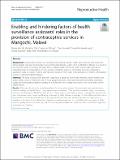| dc.contributor.author | Kok, Maryse | |
| dc.contributor.author | Tolani, Madalitso | |
| dc.contributor.author | Mtonga, Wongani | |
| dc.contributor.author | Salamba, Thom | |
| dc.contributor.author | Mwabungulu, Twambilire | |
| dc.contributor.author | Munthali, Arnold | |
| dc.contributor.author | Smet, Eefje | |
| dc.contributor.author | Chinsakaso, Benedict | |
| dc.date.accessioned | 2022-01-25T21:55:22Z | |
| dc.date.available | 2022-01-25T21:55:22Z | |
| dc.date.issued | 2020-04-20 | |
| dc.identifier.citation | Kok, Maryse & Tolani, Madalitso & Mtonga, Wongani & Salamba, Thom & Mwabungulu, Twambilire & Munthali, Arnold & Smet, Eefje & Chinsakaso, Benedict. (2020). Enabling and hindering factors of health surveillance assistants’ roles in the provision of contraceptive services in Mangochi, Malawi. Reproductive Health. 17. 10.1186/s12978-020-0906-3. | en_US |
| dc.identifier.other | DOI:10.1186/s12978-020-0906-3 | |
| dc.identifier.uri | https://repository.amref.ac.ke/handle/123456789/527 | |
| dc.description | © The Author(s). 2020 Open Access This article is licensed under a Creative Commons Attribution 4.0 International License,
which permits use, sharing, adaptation, distribution and reproduction in any medium or format, as long as you give
appropriate credit to the original author(s) and the source, provide a link to the Creative Commons licence, and indicate if
changes were made. The images or other third party material in this article are included in the article's Creative Commons
licence, unless indicated otherwise in a credit line to the material. If material is not included in the article's Creative Commons
licence and your intended use is not permitted by statutory regulation or exceeds the permitted use, you will need to obtain
permission directly from the copyright holder. To view a copy of this licence, visit http://creativecommons.org/licenses/by/4.0/.
The Creative Commons Public Domain Dedication waiver (http://creativecommons.org/publicdomain/zero/1.0/) applies to the
data made available in this article, unless otherwise stated in a credit line to the data. | en_US |
| dc.description.abstract | Background: Contraceptive services are essential for promoting people’s health, and economic and social wellbeing.
Despite increased contraceptive use over the past decades, unmet need is still high in Malawi. As a result of
task shifting, health surveillance assistants (HSAs), Malawi’s paid community health worker cadre, provide an
expanded range of contraceptive services, aimed at increasing access at community level. We conducted a
qualitative study to explore enabling and hindering factors of HSAs’ roles in the provision of modern contraceptive
services in Mangochi district, Malawi.
Methods: The study involved HSAs and their supervisors, a variety of community members, health workers and
policy makers using 34 interviews and 12 focus group discussions. Data were recorded, transcribed, translated,
coded and thematically analysed according to a framework that included community-, HSA- and health systemrelated
factors.
Results: HSAs were found to be trusted providers of contraceptive services. At community level, gender norms,
decision-making and beliefs about contraceptives were intertwined. They resulted in women using contraceptive
services, including those offered by HSAs, in secret. There were misconceptions about contraceptives among both
men and women, which were insufficiently addressed by HSAs. Residence and age of HSAs influenced their role in
the provision of contraceptive services to (young) community members, whereas sex was not regarded as an
enabling or hindering factor. While most community members reported to be satisfied with the quality of HSAs’
services, quality was compromised by a lack of contraceptive supplies and other resources, and limited supportive
supervision and training.
Conclusions: HSAs in Mangochi are important contraceptive service providers. Their ability to ensure male
involvement, increase access to services for youth and address misconceptions about contraceptives needs
improvement. This requires a thorough understanding of socio-cultural norms and improved behavioural change
communication competencies, which need to be incorporated in future training under Malawi’s Community Health
Strategy.
Keywords: Contraceptive services, Family planning, Community health workers, Malawi | en_US |
| dc.description.sponsorship | The Ministry of Foreign Affairs of the Netherlands through a Health Systems Advocacy Programme led by Amref Health Africa | en_US |
| dc.language.iso | en | en_US |
| dc.publisher | Springer | en_US |
| dc.subject | Contraceptive services | en_US |
| dc.subject | Family planning | en_US |
| dc.subject | Community health workers | en_US |
| dc.subject | Malawi | en_US |
| dc.title | Enabling and Hindering Factors of Health Surveillance Assistants’ Roles in the Provision of Contraceptive Services in Mangochi, Malawi | en_US |
| dc.type | Article, Journal | en_US |

